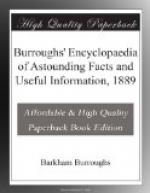FROST-BITE.—Place the party suffering in a room without fire, and rub the frozen or frosted parts with snow, or pour ice-water over them until sensation begins to return. As soon as a stinging pain is felt, and a change of color appears, then cease the rubbing, and apply clothes wet with ice-water, and subsequently, if active inflammation follow and suppuration results, a solution of carbolic acid in water, one part to thirty, should be applied. If mortification set in, amputation is generally necessary. Where persons suffer from the constitutional effects of cold, hot stimulants should be given internally, and the body rubbed briskly with the hands and warm flannel.
POISONS, THEIR SYMPTOMS AND ANTIDOTES.—When a person has taken poison, the first thing to do is to compel the patient to vomit, and for that purpose give any emetic that can be most readily and quickly obtained,
and which is prompt and energetic, but safe in its action. For this purpose there is, perhaps, nothing better than a large teaspoonful of ground mustard in a tumblerful of warm water, and it has the advantage of being almost always at hand. If the dry mustard is not to be had, use mixed mustard from the mustard pot. Its operation may generally be facilitated by the addition of a like quantity of common table salt. If the mustard is not at hand, give two or three teaspoonfuls of powdered alum in syrup or molasses, and give freely of warm water to drink; or give ten to twenty grains of sulphate of zinc (white vitriol), or twenty to thirty grains of ipecac, with one or two grains of tartar emetic, in a large cup of warm water, and repeat every ten minutes until three or four doses are given, unless free vomiting is sooner produced. After vomiting has taken place, large draughts of warm water should be given the patient, so that the vomiting will continue until the poisonous substances have been thoroughly evacuated, and then suitable antidotes should be given. If vomiting cannot be produced, the stomach-pump should be used. When it is known what particular kind of poison has been swallowed, then the proper antidote for that poison should be given, but when this cannot be ascertained, as is often the case, give freely of equal parts of calcined magnesia, pulverized charcoal, and sesquioxide of iron, in sufficient quantity of water. This is a very harmless mixture, and is likely to be of great benefit, as the ingredients, though very simple, are antidotes for the most common and active poisons. In case this mixture cannot be obtained, the stomach should be soothed and protected by the free administration of demulcent, mucilaginous or oleaginous drinks, such as the whites of eggs, milk, mucilage of gum arabic, or slippery elm bark, flaxseed tea, starch, wheat, flour, or arrow-root mixed in water, linseed or olive oil, or melted butter or lard. Subsequently the bowels should be moved by some gentle laxative, as a tablespoonful or two of castor oil, or a teaspoonful of calcined magnesia; and pain or other evidence of inflammation must be relieved by the administration of a few drops of laudanum, and the repeated application of hot poultices, fomentations and mustard plasters. The following are the names of the articles that may give rise to poisoning, most commonly used, and their antidote:




